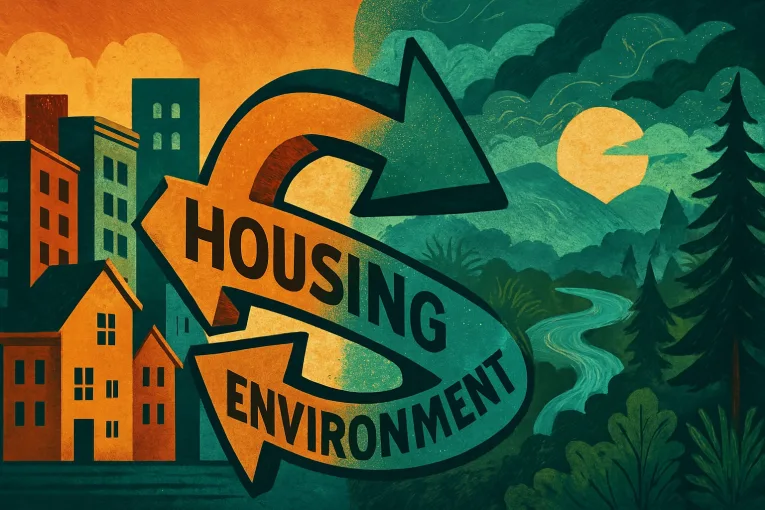SB 607 Amended to Prevent Environmental Law Rollbacks
May 24, 2025

Generated Image
By Vanguard Staff
A broad coalition of environmental justice organizations, conservation advocates, and labor unions is praising California Senate President pro Tempore Mike McGuire and Senate Housing Chair Anna Caballero for amending SB 607, a controversial bill that critics warned would have drastically weakened the California Environmental Quality Act (CEQA) and undermined protections for vulnerable communities.
SB 607, originally authored by Senator Scott Wiener, aimed to overhaul environmental review processes for a wide range of development projects across California—including freeways, railyards, power plants, and mining operations. Opponents of the bill warned it could gut critical environmental safeguards and roll back decades of work to protect public health, particularly in historically marginalized communities.
On Thursday, SB 607 passed out of the Senate Appropriations Committee with major revisions. The amended bill deletes the original substantive content and replaces it with intent language signaling continued legislative discussions around CEQA reform, effectively tabling the most controversial provisions.
“Thank you to Pro Tem McGuire and Chair Caballero for recognizing that the language of SB 607 would have created significant unintended consequences on communities and new legal uncertainties,” said Raquel Mason of CEJA Action, the advocacy arm of the California Environmental Justice Alliance. “We look forward to working with the Legislature and the Governor to inform a bill that reflects California’s values like protecting communities and our air, land and water.”
Environmental justice groups had rallied against SB 607 in recent weeks, warning that it would open the door to increased pollution in low-income neighborhoods and communities of color—areas that already bear a disproportionate burden from industrial and infrastructure projects.
“Environmental justice communities have long been disproportionately burdened by development that prioritizes profit over community health,” said Aleja Maria Cretcher of Communities for a Better Environment. “Under the previous version of SB 607, we would face even more pollution. CEQA is the only mechanism that ensures frontline communities have a meaningful voice when advocating for those protections.”
Labor groups also raised alarms about the potential long-term economic consequences of weakening CEQA.
“CEQA is critical to ensuring sustainable development and preventing construction moratoriums,” said Chris Hannan, President of the State Building and Construction Trades Council of California. “Degradation of the environment and public health can, and has, caused construction moratoriums and other restrictions on growth that, in turn, reduce future employment opportunities for construction workers and other Californians.”
Although some developers and business advocates have argued that CEQA slows housing production and adds to the state’s affordability crisis, opponents of SB 607 noted that the environmental law has been in place for more than 50 years—during which California has grown into the fourth largest economy in the world.
“SB 607, as originally drafted, would have taken a wrecking ball to decades of hard work to combat environmental injustice, and what’s worse, it was promoted as an affordable housing solution,” said Asha Sharma of Leadership Counsel for Justice & Accountability. “But SB 607 was never a housing bill; it was a broad rollback of the primary public process that frontline communities rely on to protect their public health.”
Legal experts and planning advocates also raised serious concerns about the bill’s structure, saying its confusing language could have backfired and led to increased litigation and delays.
“Even for those that support CEQA reform, SB 607 was not the solution,” said Matthew Baker, Policy Director for the Planning and Conservation League. “The changes to review standards that 607 would impose will cause tremendous legal confusion, more litigation, and further uncertainty for developers. As originally drafted, SB 607 would not have sped things up, it would only slow things down.”
The rollback effort also came amid ongoing federal deregulation of environmental protections, further heightening concerns.
“Federal environmental laws are already under attack by the Trump Administration,” said Frances Tinney of the Center for Biological Diversity. “This is the wrong time to roll back environmental and public health protections that we all depend upon. We are pleased to see that Senators McGuire and Caballero agree.”
Esther Portillo of the Natural Resources Defense Council added, “We are living in unprecedented times where our environment and public health are under threat from the federal government. Our state leaders must ensure that California continues to economically thrive without irreparably harming environmental protections.”
The revised SB 607 now heads to the Senate floor, though Chair Caballero noted that negotiations on the future of CEQA reform will continue through the budget process and in conversations between the Assembly, Senate, and Governor’s office. Environmental and labor groups say they will remain engaged in the process to ensure any reforms center community health, environmental sustainability, and equitable development.
Categories:
Breaking News Environment Housing State of California
Tags:
Aleja Maria Cretcher California Senate Housing Chair Anna Caballero CEJA Action CEQA Chris Hannan Communities for a Better Environment Raquel Mason SB 607 Scott Wiener
Search
RECENT PRESS RELEASES
Related Post



